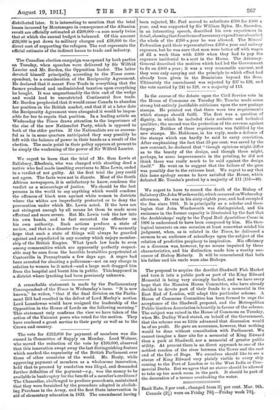The vote for £252,000 for payment of members was dis-
cussed in Committee of Supply on Monday. Lord Wolmer, who moved the reduction of the vote by £100,000, observed that this innovation swept away the last distinguishing feature which marked the superiority of the British Parliament over those of other countries of the world. Mr. Healy, while approving payment of members as a wholesome innovation, held that to proceed by resolution was illegal, and demanded further definition of the payment—e.g., was the money to be available in bankruptcy for the benefit of a member's creditors ? The Chancellor, challenged to produce precedents, maintained that they were furnished by the procedure adopted in abolish- ing Purchase in the Army, and the first State intervention in aid of elementary education in 1833. The amendment having been rejected, Mr. Peel moved to substitute £300 for £400 a year, and was supported by Sir William Byles. Mr. Snowden, in an interesting speech, described his own experiences in detail, showing that four items of necessary expenditure absorbed the whole of the £200 a year he was allowed. The Miners' Federation paid their representatives £350 a year and railway expenses, but he was sure that men were better off with wages of £2 a week than with £300 when they had to pay the expenses incidental to a seat in the House. The Attorney- General described the motives which had led the Government to fix on £400 a year; it was a very reasonable amount, and they were only carrying out the principle to which effect bad already been given in the Dominions beyond the Seas. Ultimately the amendment was rejected by 237 to 128, and the vote carried by 241 to 128, or a majority of 113.


































 Previous page
Previous page